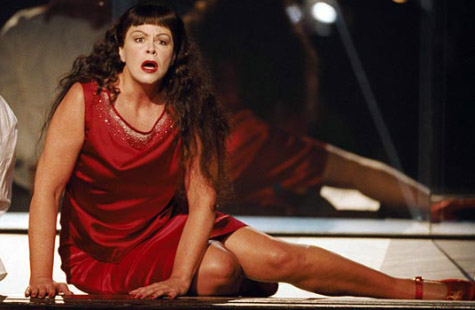Our Own Little Stevie reflects on the Met's new Macbeth.I'd like to admit a guilty pleasure of mine: I've secretly been waiting with a lot of anticipation for
Maria Guleghina to sing in
Macbeth and
Norma this year. I have not told this to many people because it seems that the common expectation has been that she would be just short of a train wreck in both roles. Many of my wise opera buddies have commented on her wild/out-of-control/harsh/shrill/screamy/erratic voice and technique, and her inability to execute coloratura work. Yet anyone who saw
Trittico or
Cavalleria last season must have realized she's in prime mid-late career voice at the moment. Many who already commented on the Sirius broadcast from tonight (10/26) heard it right - she had a GREAT night in
Macbeth.
I am an advocate of giving artists the benefit of the doubt when they have an off night because I am aware of the pressures and intricate details that can affect the voice at any given performance. I hate to be present when it occurs (who does at these prices) but it happens. I refused to comment in depth about the singing in the
Lucia two weeks ago for just that reason. My return visit to that opera last night unfortunately confirmed most of my initial impressions (excepting of course the pleasure of
Stephen Costello's debut as Edgardo and the secure high acrobatic singing of
Annick Massis), however my impression of
Macbeth, especially in regard to Guleghina couldn't be further from the negative reviews I read in major publications.
Most of the press fell over themselves in praise for
Dessay in
Lucia, yet claim the new
Macbeth is "flawed", "lacking", and "sub-par" due to the performance of
Maria Guleghina. To put Dessay on such a pedestal and then savage Guleghina just isn't right. As told to me by a Met employee Mme. Guleghina was very hurt and upset by the press reaction to her performance. Tonight she took the opportunity of being in voice to prove them wrong.
As seen and heard from Parterre Box 5 Guleghina gave penetrating insight, virile sexuality, and a HUGE voice to the part. I'm not much of a fan of "heroic" style belting (you all can keep
Dimitrova and her like), but there is something to be said for the visceral thrill of hearing Maria hurl off her high notes at maximum tension. I heartily welcome it in the age of
Fleming,
Gheorghiu,
Netrebko, et al. And OH how that sound dominated the ensemble at the end of the Banquet Scene (
Turandot anyone?) And she certainly does have the ability to sing many florid passages extremely well.
What I particularly appreciated was how she took her big voice and scaled it down for certain passages in order to execute some of the coloratura. She did this quite successfully in "La luce langue" and the Brindisi, less so in "Vieni t'affretta!" because she was using too big a sound. But come on people, give her a few minutes to warm up! Honestly, she did some stuff vocally that I didn't think she could do - the acuti in the Brindisi were really crisp, and I particularly enjoyed the way she used the staccato to pop up to the top note of the scale and how she beautifully handled those melismas.
On the acting side she totally showed her lust and love for Macbeth. This was not a cold hearted Lady - but more a victim of her blood lust through their greed for power and passion for each other. When
Marton played the role (my only other experience with the opera in live performance) I recall her as coming off very sexless - not to say without passion - but lacking in femininity. Guleghina uses her body and her sex appeal openly in the role and it brings just the right edge of warmth to make you believe that she's not in it for herself, she's in it because she loves her man (and this sex appeal and femininity will no doubt add the flame to her
Turandot in the 09/10 season). It makes the Sleepwalking Scene really tragic. This aria was concentrated, intense, without being all over the place as many an operatic mad scene can be (no I will not mention any names). She doesn't have a pianissimo D flat to end the scene, so she opted to get the note at full voice securely for a moment facing upstage and then take the scale down. Aside from that my only criticism is that she doesn't really possess any chest voice, and I miss that dark quality in the low lying notes of this part. "Chest Nuts," as
Marilyn Horne refers to them, may wish to skip this performance.
Banquo appears to be much more suited to
John Relyea's current vocal state than Raimondo in
Lucia was the night before. He didn't polish all the wool out of his tone, but it seems to lie in a warmer, lower place of his range. He looked really handsome too. This was probably my favorite of the performances I've seen from him.
I've heard impressions from people of
Zeljko Lucic as Macbeth that range from excellent to miscast. I found his voice very pleasant - warm, excellent dynamic control, emotional - if perhaps lacking Verdian "boom" for the biggest moments. I liked his portrayal as a wounded king at once hungry to ascend the throne yet unable to live anymore with the burden of his bloody actions. He doesn't shy away from playing his emotional wounds and softer side. The phrasing in "Pieta, rispetto, amore" was superb. Staged with him sitting in a chair he communicated in a unique way Macbeth's need to believe the prophesy of the Witches and the underlying resignation that everything is about to fall apart. It was heartbreaking in its simplicity and received the biggest amount of solo applause of the evening.
Dimitri Pittas as Macduff was a surprise - bright and clear voice (with maybe not the best Italian vowels), and the lament for his family was a nice moment. The orchestra is in top form, and I'm not crazy about
James Levine conducting Verdi most of the time, but the dynamic range was extraordinary - dead silent pauses leading to giant chords bombasting out into space, heavenly strings, and all very carefully calibrated to the singers onstage (another thing I noticed that differed from many pro reviews). From my box I could actually see Levine singing along with most of the singers for a good portion of the evening, very much enjoying making music with them.
And now for the bad news. The sets incorporate a mishmash of stylistic elements, from moving pillars of black stone that have light-up fluorescent bands in them, to green lasers projected onto the black sky for the arrival of the eight Kings from on high (straight out the The Saint circa 1979), a blue egg that raises from the stage to illuminate the apparitions, a jeep that is pushed around onstage, with all of this taking place on a giant black rock disk. It's a tidy and minimal production, not cheap looking, relying on simple props, set pieces, some nice back drops and sometimes elegant lighting effects (and a lot of stage smoke).
But what got me were the witches. They are dressed in a get up that I really don't understand. Were they bag ladies? A coven of local fishwives that meet secretly to conjure spells (and practice spastic dance moves)? While I liked
Adrian Noble's direction of the principals, some of his choices just don't cohere with the rest. I don't mind updated or abstract productions if it is all of a whole. Granted I am not versed on post WW2 Scotland, so maybe it made sense, but I wish we'd been let in on what was up with those witches.
On the plus side Noble could give
Mary Zimmerman a couple of pointers on how to deal with a static chorus. It looked like he had twice as many people on stage for the Banquet, most of whom must stand and watch in disbelief as Macbeth sees the ghost of Banquo, yet there was a fluidity and tension that didn't exist in the Mad Scene I saw again at
Lucia the night before. This
Macbeth plays well in spite of the questionable taste and stylistic incongruities which are at worst mildly annoying but really don't affect the commitment of the musicians and singers in producing a fine evening of Verdi.
-- Little Stevie
Labels: critic, levine, little stevie, met, Our Own
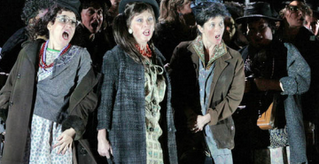 "When the Met last offered Verdi's Macbeth a quarter century ago, the New York Times slammed Sir Peter Hall's staging as 'the worst new production to struggle onto the Metropolitan Opera's stage in modern history' and the opening night audience greeted the curtain calls with some of the loudest boos in the theater's history. On October 22, the company neatly avoided a reprise of this notorious fiasco when they offered a bland take on the opera unlikely to rouse much strong feeling at all. "
"When the Met last offered Verdi's Macbeth a quarter century ago, the New York Times slammed Sir Peter Hall's staging as 'the worst new production to struggle onto the Metropolitan Opera's stage in modern history' and the opening night audience greeted the curtain calls with some of the loudest boos in the theater's history. On October 22, the company neatly avoided a reprise of this notorious fiasco when they offered a bland take on the opera unlikely to rouse much strong feeling at all. "
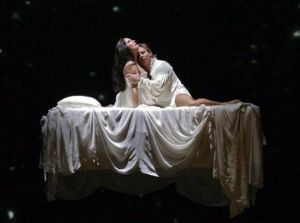 Of course, cher public, you heard it about it here a
Of course, cher public, you heard it about it here a 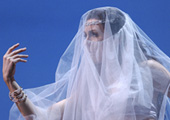 La Cieca has just been informed that soprano Mary Dunleavy will participate in tonight's panel discussion "Opera and Technology" at The Italian Academy for Advanced Studies in America at Columbia University. No word on whether La Dunleavy replaces or supplements the previously announced Lucy Shelton. Our own JJ will be
La Cieca has just been informed that soprano Mary Dunleavy will participate in tonight's panel discussion "Opera and Technology" at The Italian Academy for Advanced Studies in America at Columbia University. No word on whether La Dunleavy replaces or supplements the previously announced Lucy Shelton. Our own JJ will be 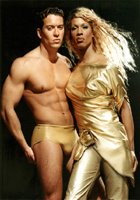 "Super Drag Diva" Shequida (pictured here with unidentified gogomeat) will make all kinds of history on December 16 and 17 when she sings her first Komponist in performances of Ariadne auf Naxos at Merkin Concert Hall. This co-production by Ensemble du Monde, Opera Noire of New York and Pegasus Opera of London will also feature the Met's Anita Johnson as Zerbinetta as well as La Cieca's dear colleagues Jakob Feldman and Amy Synatzske in supporting roles. And as if the dazzle quotient were not already set on stun, gracing the stage as guest hostesses will be Martina Arroyo and Hilda Harris.
"Super Drag Diva" Shequida (pictured here with unidentified gogomeat) will make all kinds of history on December 16 and 17 when she sings her first Komponist in performances of Ariadne auf Naxos at Merkin Concert Hall. This co-production by Ensemble du Monde, Opera Noire of New York and Pegasus Opera of London will also feature the Met's Anita Johnson as Zerbinetta as well as La Cieca's dear colleagues Jakob Feldman and Amy Synatzske in supporting roles. And as if the dazzle quotient were not already set on stun, gracing the stage as guest hostesses will be Martina Arroyo and Hilda Harris.